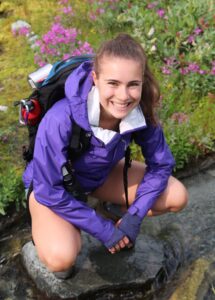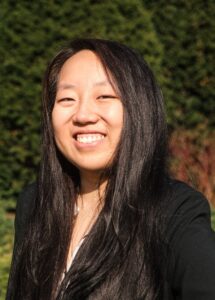Congratulations to our current Graduate Program in Neuroscience (GPN) students who have received awards through the Canada Graduate Scholarships – Doctoral program from the Canadian Institutes of Health Research (CIHR) and the Natural Sciences and Engineering Research Council (NSERC).
Aysha Allard Brown
 Aysha completed her BSc at UBC majoring in Biology with a minor in Kinesiology. Aysha then decided to pursue a master’s in Neuroscience and fast-tracked into the PhD program. Currently, Aysha is starting her third year of her PhD in Neuroscience supervised by Dr. Brian Kwon.
Aysha completed her BSc at UBC majoring in Biology with a minor in Kinesiology. Aysha then decided to pursue a master’s in Neuroscience and fast-tracked into the PhD program. Currently, Aysha is starting her third year of her PhD in Neuroscience supervised by Dr. Brian Kwon.
Aysha’s thesis project is titled, “Assessing the effect of blood pressure management and thromboembolic prophylaxis on spinal cord hemorrhage after traumatic injury.” Aysha enjoys how dynamic research can be, where every day is different and filled with a unique set of challenges and discoveries.
“During my undergraduate degree, I volunteered at a physiotherapy clinic, working closely with individuals living with spinal cord injuries and neurological diseases. This experience provided me with valuable insights into the specific concerns and research areas that mattered to each individual. This motivated me to enter the field of spinal cord injury research so that I could gain a versatile skill set and advocate for patient care,” says Aysha.
In her free time, Aysha is part of the ICORD Trainee Committee, and enjoys spending time in the mountains (hiking, skiing, snowshoeing) or on the water (kayaking).
Rocio Hollman
 Rocio completed her bachelor’s degree in Cellular, Anatomical, and Physiological Sciences at UBC. Currently, Rocio is starting her fourth year of her PhD in Neuroscience supervised by Dr. Shernaz Bamji.
Rocio completed her bachelor’s degree in Cellular, Anatomical, and Physiological Sciences at UBC. Currently, Rocio is starting her fourth year of her PhD in Neuroscience supervised by Dr. Shernaz Bamji.
Rocio’s thesis project focuses on understanding the role of the intellectual disability gene, ZHHDC9, in oligodendrocyte differentiation and myelinogenesis. Rocio is fascinated by the brain and hopes to help further our understanding of how different brain cells play a role in brain function. She believes if we can better understand how our brain develops and functions, we’ll be much better equipped to develop therapies for brain disorders and diseases.
“I most enjoy how research encourages curiosity. I find it satisfying to successfully troubleshoot experiments and finally (often after months of effort) optimize experimental conditions. Research is also incredibly collaborative and I enjoy working with my awesome lab teammates!” says Rocio.
In her free time, Rocio is part of UBC’s Thunderbird Sport Club Triathlon team and loves training for and racing triathlons.
Shalini Iyer
 Shalini completed her bachelor’s degree in Biomedical Science and Psychology as well as her master’s degree in Neuroscience at York University. Currently, Shalini is starting her second year of her PhD in Neuroscience supervised by Dr. Mark Cembrowski.
Shalini completed her bachelor’s degree in Biomedical Science and Psychology as well as her master’s degree in Neuroscience at York University. Currently, Shalini is starting her second year of her PhD in Neuroscience supervised by Dr. Mark Cembrowski.
Shalini’s thesis project identifies sex-specific pharmacological interventions for autism by targeting a distinct neuron type. In an undergraduate neuroscience and developmental biology lecture, Shalini remembers learning that exposure to various environmental factors during pregnancy can disrupt critical developmental timepoints contributing to disorder. This sparked her interest in how environmental insults can lead to neurodevelopmental disorders.
“One of my favourite things about research is having the liberty to ask questions and design my own projects to investigate the answer to something that hasn’t been discovered yet. Moreover, I enjoy collaborating and networking with scientists across diverse fields and expertise, as this enhances my growth as a researcher, fostering a dynamic exchange of knowledge and new perspectives,” says Shalini.
Shalini serves as the Co-president for the Neuroscience Trainee Association, and is also actively involved with STEM outreach organizations.
Megan Liu
 Megan completed her BSc in Neuroscience with distinction at McGill University in 2020 and is currently completing her MSc in Neuroscience at UBC in the lab of Dr. Kiran Soma. In September, Megan will be starting as a first year PhD student in McGill’s Integrated Program in Neuroscience (IPN) with her Canada Graduate Scholarship.
Megan completed her BSc in Neuroscience with distinction at McGill University in 2020 and is currently completing her MSc in Neuroscience at UBC in the lab of Dr. Kiran Soma. In September, Megan will be starting as a first year PhD student in McGill’s Integrated Program in Neuroscience (IPN) with her Canada Graduate Scholarship.
Megan’s master’s thesis project studies the motivation to exercise in rats using a novel wheel running task. Her other projects in the lab include optimizing an ultrasensitive method for measuring multiple estrogens through liquid chromatography tandem mass spectrometry, and investigating the conversion of the brain-selective prodrug DHED to estradiol in peripheral tissues and different regions of the brain.
During Megan’s first year in her PhD, she will complete three four-month rotations in different neuroscience labs at McGill. “One of my rotations will be with Dr. Mark Brandon, who studies how neuronal circuits in the entorhinal-hippocampal memory system function in health and disease,” shares Megan.
Megan serves as the VP Finance of the Neuroscience Trainee Association and is an avid member of UBC’s Salsa Rueda club.
Chloe Chernoff
 Chloe received the NSERC Postgraduate Scholarship – Doctoral to start her first year of her PhD in Psychology at the University of Cambridge, UK this fall. Chloe just completed her master’s in Neuroscience at UBC this past spring under the supervision of Dr. Catharine Winstanley.
Chloe received the NSERC Postgraduate Scholarship – Doctoral to start her first year of her PhD in Psychology at the University of Cambridge, UK this fall. Chloe just completed her master’s in Neuroscience at UBC this past spring under the supervision of Dr. Catharine Winstanley.
Chloe’s master’s thesis project investigated the role of prefrontal noradrenaline in cost-benefit decision making and impulsivity. Her PhD work will focus on the neurobiology underlying vulnerability to develop compulsive drug seeking behaviours. Chloe is also investigating how the noradrenergic locus coeruleus may contribute to impulsivity, risky decision making, and vulnerability to addiction-like behaviour.
Chloe chose the field of psychology/neuroscience out of the curiosity and urge to understand what drives the development of addiction and related disorders, and to one day make a significant impact on the prevention or treatment outcomes for this devastating affliction.
“It’s hard to pick one thing I enjoy most about research, so I’d say it is a three-way tie between 1. the constant novelty and endless chain of questions you can ask, 2. the collaborative nature of science and all the wonderful humans I have met through it, and 3. working with the adorable rats,” says Chloe.


